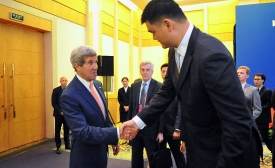ukraine
Russia-watchers and Russians have spent much of the year debating what's behind Putin's adventurism in Ukraine, his meddling in eastern Europe's Baltic states, his support for anti-American dictators like Syria's Bashar al-Assad and North Korea's Kim Jong Un, and the headaches he is generally causing Western leaders.
The idea of Russian “soft power” became fashionable, but it was very different to European “soft power”. So-called Russian soft power was just “softer power”, including any means of coercion not involving tanks. It was, in the English phrase, “softly-softly” power, or “covert power”, the type of behind-the-scenes influence encapsulated in the Russian phrase kuluarna polityka – politics in corridors, not just away from public influence, but without formal record.
Russia has donated a Christmas tree to the Notre Dame cathedral in France, following an appeal for help. The cathedral had struggled to raise the money for its annual tree and appealed to foreign embassies in Paris for assistance.
Russia has condemned legislation passed by the United States Congress authorizing $350 million in military aid to Ukraine's government, which has been fighting pro-Russian separatists in the east.
Russian President Vladimir Putin’s covert aggression in Ukraine continues – and so do Western sanctions against his country. But the economy is not all that is under threat; Russia’s soft power is dwindling, with potentially devastating results.
The fact that families run from a war zone is heartbreaking but hardly unexpected. (...) Most of those who fled were Russian speakers from the east, but this still raises a sobering question: If this is a conflict between Ukraine and Russia, why did so many Ukrainians choose to cast their lot with the enemy?
Twenty-five years after the fall of the Berlin Wall signaled the collapse of the Kremlin’s grip on eastern Europe, Russia is reasserting some of its lost influence. That is most obvious in Ukraine, where unmarked tanks roll across the countryside in support of pro-Russian separatists.

U.S. public diplomacy tends to react to situations, rather than taking initiative, says Philip Seib.







